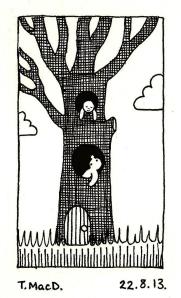
In the Instructions of Dogen Zenji, there is the following passage:
The successive Buddhas and Patriarchs were all seekers of the Way. Without this mind that seeks the Way (bodhi-mind), everything one does is in vain. Hence, monks must generate bodhi-mind. To generate bodhi-mind is to arouse the mind that vows to save all sentient beings. Secondly, there must be a yearning for olden times (mokoshin). Thirdly, there must be truth-seeking mind. These Three Minds are studied by beginners as well as those who have been practising for a longer time.
These Three Minds—bodhi-mind, yearning for former times, and truth-seeking mind—cannot be divided and used according to time, place, and rank. Rather, they are always one mind fulfilling one great role.
With regard to `bodhi’ in bodhi-mind, in the Dainichi Sutra are the words, `What is bodhi? Bodhi is to truly know one’s own mind.’ And so, bodhi has been translated as `awakening’. It is awakening to the true nature of the practitioner’s mind. Bodhi-mind, then, is awakening to the Way or Dharma that is expressed as `the true nature of things is formless.’ In so doing, there arises the feeling of wishing to save all sentient beings. Consequently, there is the danger of a great mistake being made if we understand in a literal way the following passage from the chapter `Awakening the Bodhi-mind’ in Dogen Zenji’s Shobogenzo: `To awaken the bodhi-mind means to vow not to cross over to the other shore of enlightenment before all sentient beings have done so.’ It is necessary to really chew this up well and digest it.

`Mokoshin‘ is a word that describes the yearning for the Buddhas and Patriarchs. In the Buddha-dharma, `yearning for’ means that we must meet them face-to-face (shoken). Whenever we first meet another person or thing face-to-face, we say this is `shoken‘. The Chinese character for `sho’ is written with two components `tree’ and `eye’. This means that if we climb to the top of a tree, we can see well. And so, this word `shoken‘ is used for those times when we see something intimately or clearly. When Dogen Zenji first had `shoken‘ with Nyojo Zenji, he said, `I have come from a small country that is far away. I beg your permission to allow me to visit you privately for dokusan (to ask a master about the Dharma) at any time of day or season.’ Taking one glance at Dogen Zenji, Nyojo Zenji replied, `From now on, you may come to my room and ask about the Dharma at any time of the day or night. I will allow it as a father allows his son.’
`The truth’ of `seeking for the truth’ means `the Dharma of thusness’, the source of bodhi. When we sit in zazen, all sorts of thoughts come and go that cannot be labelled delusion, confusion, or satori. These thoughts are the truth, they are the Dharma of thusness. In other words, they are the true form of your own mind that was mentioned above. However, quickly the viewpoint of the ego-self arises saying, `This is delusion. That is confusion.’ Even though such egoistic viewpoints themselves are the Dharma of thusness, you seek elsewhere for the truth. The Dharma of thusness is all of the activities throughout the day. It is life and death, coming and going. It is pain and comfort, rising and sinking. It is the viewpoint of the ego that clouds and obscures thusness. These viewpoints arise because a separation is created between what is seen and that which sees.
Tenkei Zenji said, `Those who are true to the Buddha-dharma are true to the way of the world. Those who are true to the way of the world are true to the Buddha-dharma.’ It is the ego-consciousness that makes a distinction between the way of the world and the Buddha-dharma. Zen is the instrument that shows the direction of how to grind up the ego-consciousness so that we can truly know the nature of our minds. For those of us who aspire to practise Zen, it is necessary to live our lives with the Three Minds mentioned in the Instructions of Dogen Zenji as our motto deeply ingrained in our minds. And then, it is also necessary to constantly make the effort to forget the self in each activity.
More posts by Harada Sekkei Roshi click here.
Harada Sekkei Roshi is the Abbot of Hosshinji, Japan. He is the author of The Essence of Zen. This article was first published in the Hosshinji Newsletter, Fall 2001, and is here reproduced with their kind permission.
Published in the February 2002 Buddhism Now
Read some more Zen teachings from Dogen.
Categories: Buddhism, Chan / Seon / Zen, Harada Sekkei Roshi, Mahayana

“… yearning for olden times…”
Yearning = desire = attachment = suffering?
I really appreciate that in your articles you define the words for us and I just love the definition of “skoken” and the picture showing it as well, both of these together help me learn as I am a visual learner! in gassho, Shokai